AvePoint Cloud Updates Keep Marching On


March on over to the AvePoint Cloud Backup for some important new updates. This release, we continue to expand the capabilities of the AvePoint Confidence Platform to optimize SaaS operations and secure collaboration – empowering both IT administrators and end users. Here’s an overview of the top updates for March 2023.
AvePoint Cloud Backup
What’s New in Cloud Backup for Microsoft 365?
Improved Role Based Access Controls (RBAC) for end-user restore via AVA and ReCenter are now available. Admins, you can now configure end-user restore settings based upon the scope and permission level at the Microsoft 365 service level to control if your end-users can recover backup data via ReCenter and AVA.
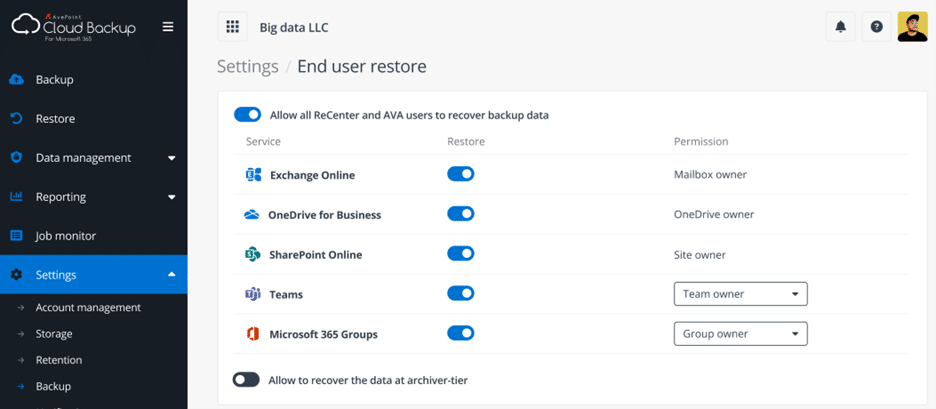
This release offers better Recovery Time Objectives and daily throughput for larger restores such as full sites and OneDrives. Plus, file-level filters are now available to allow you to exclude specific file types (such as MP4s or recordings) from your backups. If you use the BYOS (Bring Your Own Storage) option, this may be a cost-effective update for your organization. Contact AvePoint Support if you are interested in configuring this feature. Additionally, the Power Platform preview has been extended. If you are trialing backup for Power Platform (Power BI Workspaces and Power Automate), you can continue trialing until April 30th.
Microsoft Power Platform is revolutionizing how we get work done – enabling more informed decisions and driving efficiencies and productivity. The catch? It can be gone in the blink of an eye if you don’t have the right protection in place. Watch our latest installment of the “Watch Us Lose Data” webinar series on-demand where we share common ways you can find yourself in a sticky situation and how you can prevent it.
What’s New in Cloud Backup for Salesforce?
A new Trial Wizard is now available to help orient new users to the platform. The wizard will bring users through various test scenarios to ensure a smooth onboarding and trial experience. Expanded search capabilities are now available when restoring field level data, and when viewing backup job details, you can now search for specific objects for more accurate job tracking. Plus, Cloud Backup for Salesforce is now available in German.
What’s New in Cloud Backup for Google Workspace?
Cloud Backup for Google now supports granular level data deletion. Your users can now remove specific files and Gmails from their backups for easier compliance with your own internal audit standards as well as GDPR guidelines.
What’s New in Cloud Backup for Azure?
Azure AD backup now offers additional recovery options for Azure settings and policies, including conditional access, Intune settings, Defender policies, and other critical admin-facing features.
What’s New in Cloud Backup for Dynamics 365?
Cloud Backup for Dynamics offers improved restore options. After selecting which records you would like to restore, you can now choose to restore records that reference the selected data, records that are referenced by the selected data, or both.
The need for Backup as a Service is greater than ever before with a steady increase in ransomware attacks and a larger need for companies to protect data in SaaS applications. In the recent Gartner Market Guide for Backup as a Service, AvePoint was recognized as a Representative Vendor, download this report to learn more!
Combat ransomware attacks, user errors and permission fiascos to ensure business resiliency with AvePoint Cloud Backup.
Learn More
What’s New in AvePoint Cloud Governance?
Cloud Governance now offers expanded provisioning framework services. The supported provisioning objects will now expand to Azure AD security groups, Azure AD mail-enabled security groups, distribution lists, and shared mailboxes. While each object type will have some settings that are unique to that object type, they will all benefit from common features now available, including naming conventions, capturing primary and secondary contacts, people picker profiles, service request permissions, metadata, and defining membership are available. These object types are built into the dynamic service form model so you will have more flexibility around what the request forms look like for your end users.
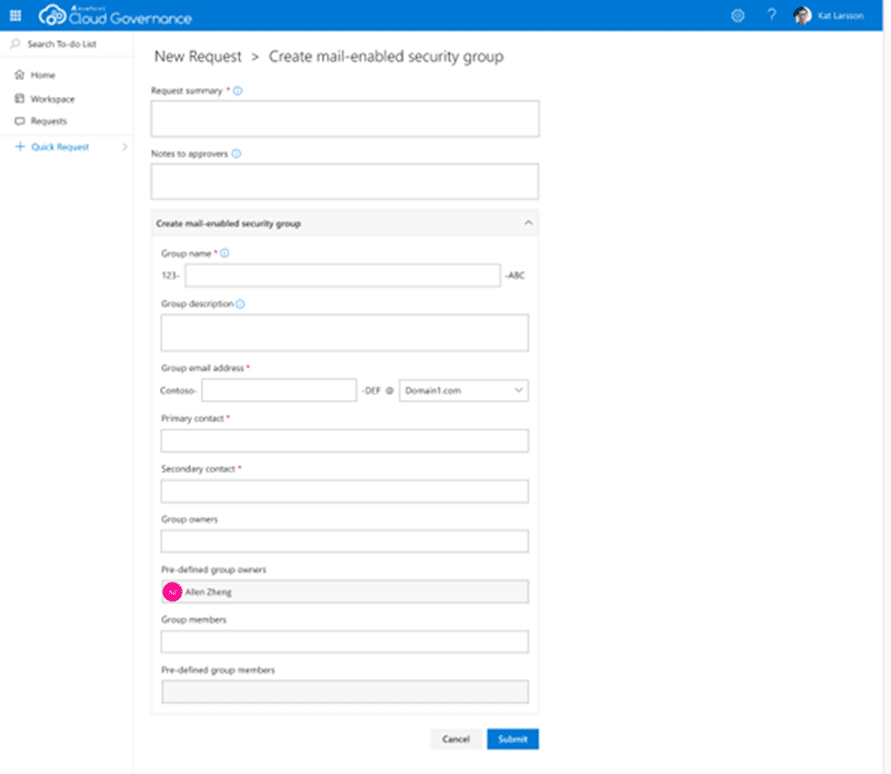
Cloud Governance now offers expanded capabilities for dynamic services with additional settings and profiles available for Microsoft 365 groups. Plus, you can now convert your existing Microsoft 365 groups to the new profile model – select the groups you wish to convert via the workspace report and apply the profile with a simple click to convert the groups.
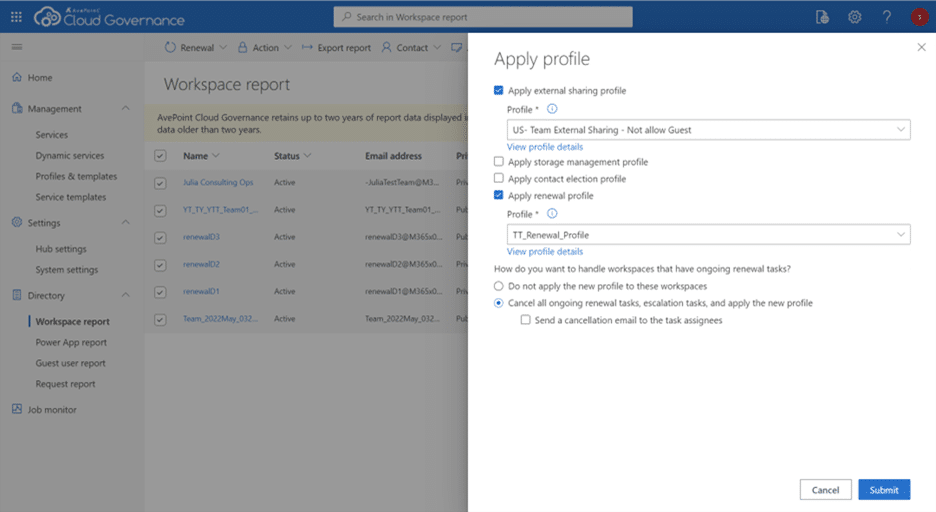
Download this free eBook to learn how to build actionable plans to mitigate risk in Microsoft 365 or any other collaboration workspace your organization uses.
Scale, automate and secure your Microsoft 365 environment with AvePoint Cloud Governance.
Learn More
What’s New in AvePoint Cloud Records?
Cloud Records Connector Framework is now available to enable your organizations to extend content lifecycle processes to any system you are using, in a consistent manner, so you can rest assured that no matter where your information is stored, the management can be applied in the same way. Cloud Records connectors allow you to create and map metadata from a connected source system for searching and reporting, classify content using terms, allow reclassification and disposal holds on synced items, assign lifecycle rules, search for managed content, run lifecycle actions (including manual approval processes), and report on lifecycle actions that need to be taken in the source system. Connectors can be developed using the available Cloud Records APIs – contact your AvePoint representative for more information on the options for connecting external systems.
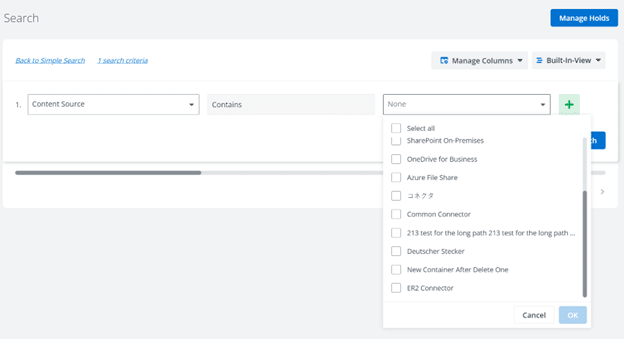
Folders and their content can now be managed as a single entity, allowing content to be managed in context, rather than at an individual document level. Plus, classification terms can be set to a folder or document set directly at a site or library level. Folders and document sets will now be surfaced in search results, and they can be reclassified and inherit settings at a document level or have holds placed on them through the Cloud Records interface. Additionally, this release offers new UI updates that aid in reporting, filtering, and performing tasks in the system along with updates to aid with physical record management for physical records that are pending loan or destruction.
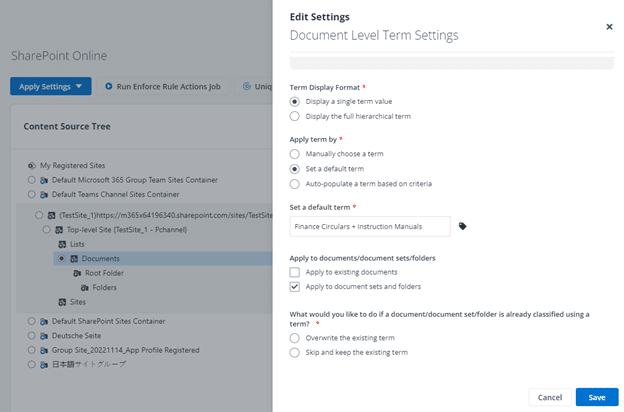
Are you struggling with data storage and consumption overages? Does your organization barely destroy content in accordance with your retention schedule or when it’s no longer required for business or legal purposes? Check out this blog to learn what our Director of Records & Information Strategy had to say about information disposal.
Take the reins of your information lifecycle with
AvePoint Cloud Records.Learn More
What’s New in AvePoint Cloud Archiving?
Cloud Archiving now offers an improved restore experience with granular level permission management for enhanced integration with ReCenter. Admins, you now have more control to set permissions around which end users can conduct restores and exports via both the ReCenter portal and a ReCenter-generated archive stub.
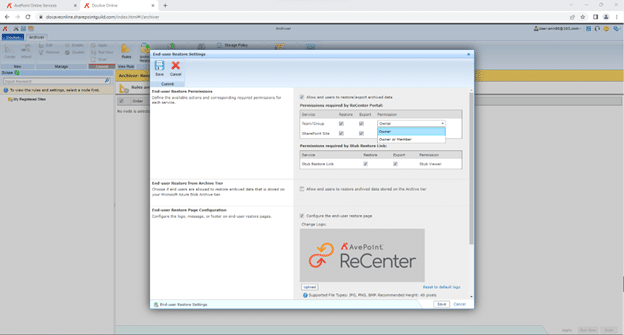
Watch our latest Virtual Lab on-demand to learn how Cloud Archiver can help you reduce storage costs and improve data quality through storage optimization.
Reduce storage costs and improve data quality and information management in Microsoft 365 with AvePoint Cloud Archiving.
Learn More
What’s new in AvePoint Policies?
In addition to the job monitoring and activity history feed, Policies now offers a summary report of all Policies activities performed that can be generated on-demand. The report can gather all the actions taken by a policy over the last week, month, or custom time range.
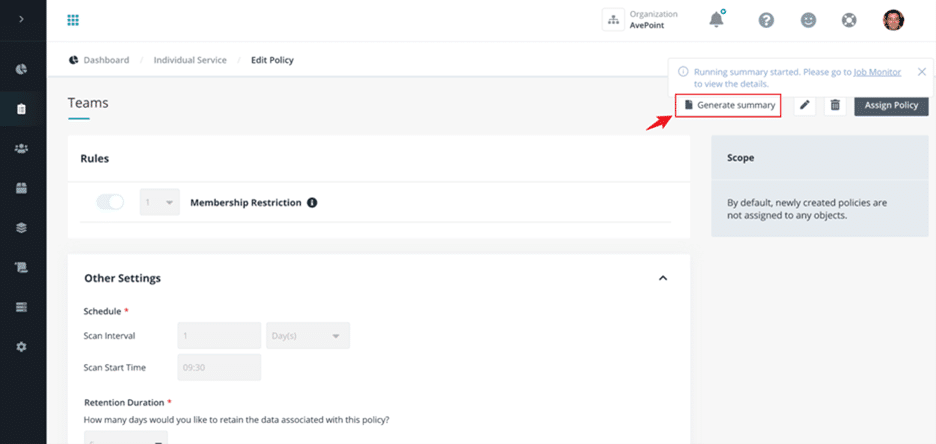
Company-wide sharing link management is now available to help mitigate exposure risk in Microsoft 365 environments resulting from company-wide sharing, where content often appears in search results broadly beyond the intended audience. Plus, Shared Channel management now allows you to specify which users are authorized to create Shared Channels so you can limit the scope of this feature to targeted users or prevent all Shared Channel creation outside of managed processes such as via Cloud Governance.
Easily enforce controls for sharing, permissions, membership and configuration across Microsoft 365 with AvePoint Policies.
Learn More
What’s new in AvePoint Insights?
High risk activity tracking now provides a multi-tenant view of user activities and aggregates them into a clear list, giving you the ability to follow up on Microsoft alerts (such as for premium sign in risk scenarios) with actions such as blocking users and confirming high-risk events. Plus, new dashboards are available to link you directly with Insights data and reports that highlight and track exposure and risk.
![]()
Insights now allows you to view all sharing links generated for a given site collection in a single report, including links that were created for specific users, organization wide, or even externally available through anonymous links. You can even opt to un-share and expire these links right from the interface. Plus, the Shadow User report has been optimized, now listing all the ways a user was granted access to a given site and you can now remove their permissions with a single click.
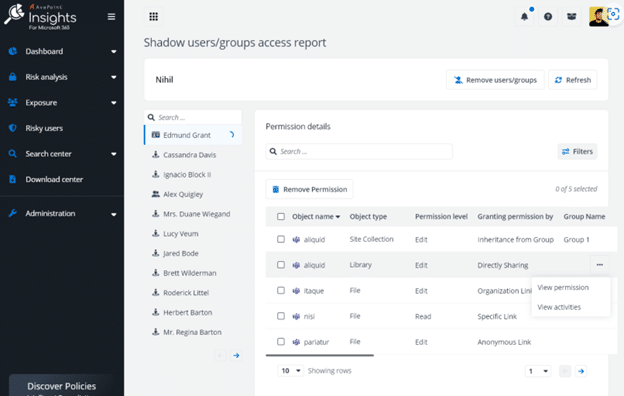
You can also now configure automation for permission reviews. New Export API updates are available for external security reviews, and you can use these APIs to connect to your own recertification processes.
Learn how you can leverage powerful tools to make it faster to identify and report on your risk and proactively mitigate issues you uncover with this free webinar.

What’s New in AvePoint Confide?
Confide now offers improved functionality for task tracking so you can more easily visualize and surface task data. This release introduces a task dashboard to highlight active tasks and the percent completed, as well as a table view making it easier for users to dive into task details.
![]()
Outlook integration now allows you to collaborate on and contribute to a Confide project straight from your Outlook environment. Upload email attachments that you receive in Outlook directly to a Confide project of your choice and share links to Confide files directly in Outlook.
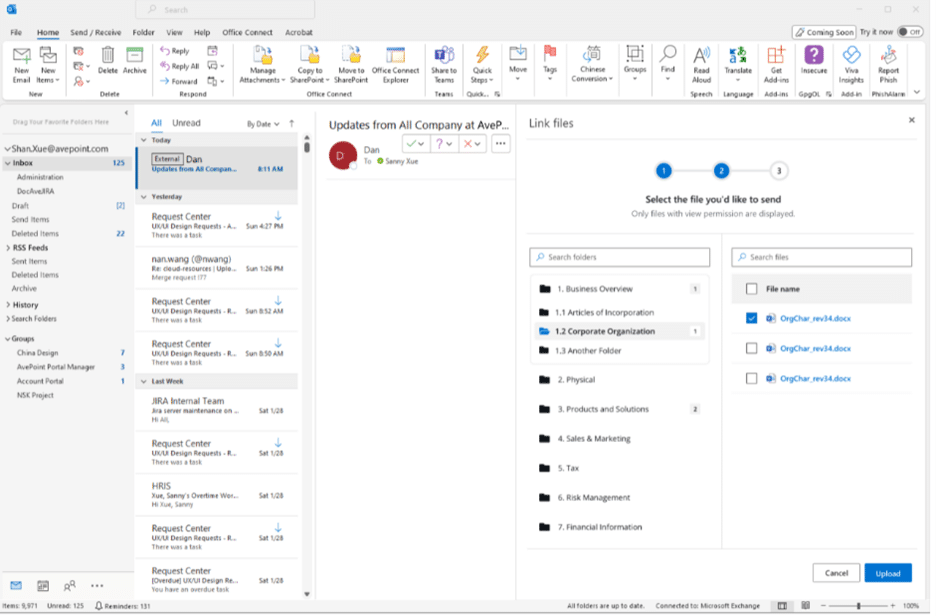
Learn how one organization used Confide to securely collaborate during a merger and acquisition by reading our case study today.
Control collaboration on your most confidential projects with
AvePoint Confide.Learn More
What’s New in AvePoint Fly?
Fly now offers user the ability to view the real-time status of migration job progress. Each mapping within a project that is in progress will now show the percentage complete and how many objects have been migrated.
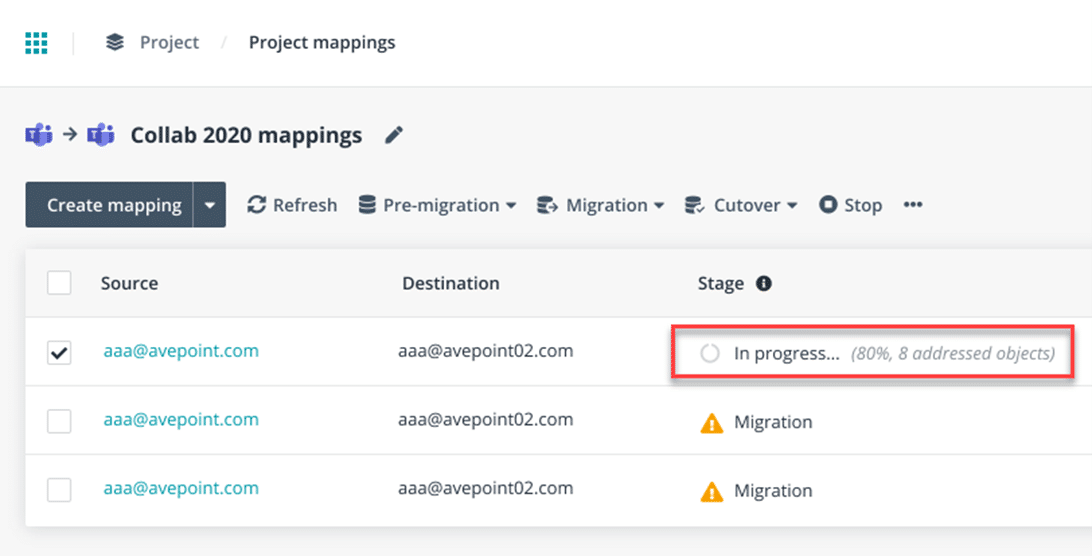
Automation through scripting is now available for Fly. The following processes will now be able to be automated via scripting: create projects, edit project mappings, start migration, monitor jobs, generate job report, download job report. Plus, In Microsoft Teams Migration, you can now convert standard or public channels to shared channels.
Learn how you can launch a stunningly successful Microsoft 365 migration in 5 simple steps.
Accelerate digital transformation to Microsoft 365 with AvePoint Fly.
Learn More
What’s New in AvePoint EnPower?
AvePoint EnPower now offers a new agent that enables easier hybrid AD management with delegated permission control. With the agent installed, you can create or edit local AD users from the cloud directly then sync up the changes to their cloud AD — you no longer need to have access to the local AD to manage these user or groups.
The dynamic workflow service is now available for Power Apps workflow monitoring and management. Admins, you can now create a dynamic workflow for Power App Connections: define the trigger scope; take action to delete the connection automatically if needed; and send an email to notify the Power App owner/co-owner, flow owner/co-owner and the connection creator once the trigger event is detected. Additionally, Call Management can now manage additional policies including calling polices, call hold policies, call park policies, caller ID policies, emergency policies, mobility policies, voice routing policies, and voicemail policies.
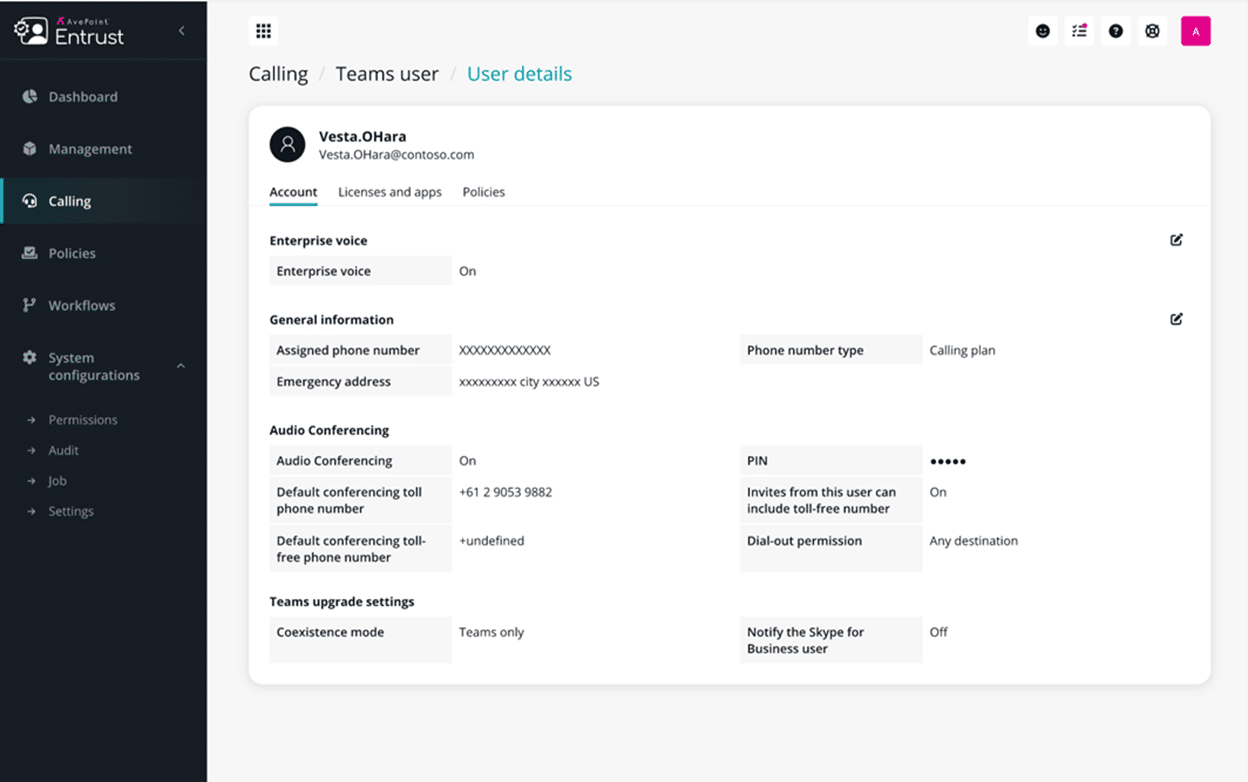
Join AvePoint and Microsoft for a half-day workshop in a town near you, where you will learn practical strategies and tactical solutions to manage and govern concerns for Power Platform.
AvePoint EnPower unburdens IT and reduces risk by aligning Microsoft 365 administration with your operational needs.
Learn More
Have you signed up for the Account Portal? It’s where you go to access user guides, release notes, how-to videos, free trials, and more! The info you need for this release can be found by simply clicking around the portal. Signing up is easy, and navigating is even easier!

Esther is AvePoint's Director of Technical Writing.



